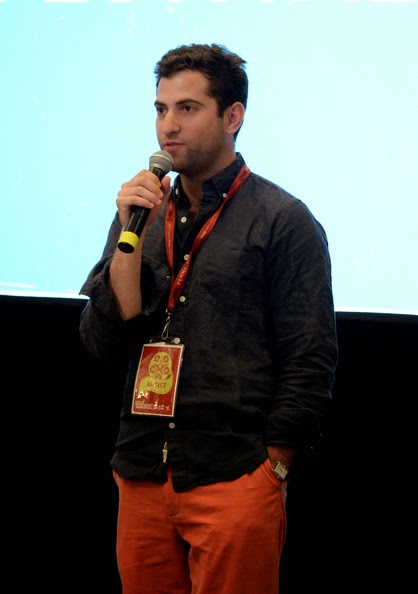 |
Director Zachary Wigon speaks onstage at The 19th Annual Nantucket Film Festival on June 28, 2014 in Nantucket, Massachusetts.
(June 27, 2014 - Source: Andrew H. Walker/Getty Images North America)
|
FROM THE MOUTHS OF FILMMAKERS:
ZACHARY WIGON
By Zachary Wigon and Joshua Handler
By Zachary Wigon and Joshua Handler
Recently I've been disturbed by the amount of people who don't seek out independent films, non-English-language films, and classics. So, I asked some of the most distinctive voices in independent and world cinema to submit responses to a few questions about why/if they think indies/non-English-language films/classics are important to view, and how those films have been influential on their careers.
The responses below are from Zachary Wigon, writer/director of THE HEART MACHINE, which premiered at SXSW this year to great acclaim.
Do you feel that it is important for aspiring filmmakers and filmgoers to view independent and world cinema and why?
Yes, very much so. If you're an aspiring filmmaker, I'm not sure there can be such a thing as too wide a variety of influence. The broader one's viewing habits are, the more approaches to filmmaking one is exposed to, and of course no artistic works are influence-free in a vacuum (though there are some that might protest that this is exactly what they do). I don't think you can have a serious understanding of what you're trying to do as a filmmaker (or as an artist in any other discipline) without an understanding of how your work fits into the broader history and traditions of the medium and the different schools/movements within. Making an effort to view international and independent cinema - films that don't find audiences as easily as Hollywood product does - is an important part of understanding the many different methods by which a filmmaker can express herself, and enables the filmmaker to have options for situating their mode of self-expression outside the traditional formats employed by "mainstream" Hollywood cinema.
Do you feel that it is important for aspiring filmmakers and filmgoers to view films of the past and why?
Yes, of course, for many of the same reasons listed above - no filmmakers work in a vacuum. In order to fully appreciate a film like, say, BLACK SWAN, it's important to understand Polanski. In order to fully appreciate Polanski, it's important to understand Hitchcock. If one understands Hitchcock, one can look at certain films by Chabrol or Truffaut or De Palma and see the myriad different directions in which his influence was taken - and compare and contrast the different interpretations of what he created. Having an understanding of film history enables filmmakers to see different potentialities in how the medium may move forward, and if artists are not here to move the medium forward - if they are only interested in regurgitating existing formats in a clone-like manner - their work is unlikely to inspire.
How did viewing indies and films from around the world help you when directing THE HEART MACHINE?
Enormously in terms of formal approach (we watched THE CONVERSATION, SIMON KILLER, BIRTH, and SHAME among many others) as well as somewhat in terms of character (I asked John Gallagher, Jr. to watch EYES WIDE SHUT for a portrait of obsession and insecurity). It was extremely helpful to watch these films, particularly the films that had formal approaches to framing and camera movement that were consistent with what we were trying to achieve. Looking at, for example, the manner in which SIMON KILLER preserves tension throughout by simple things like keeping certain elements of the scene offscreen, or moving the camera in a seemingly counterintuitive fashion, was extremely helpful to the DP, Rob Leitzell, and myself when it came to determining how we would shoot the film and put as much tension into the narrative as possible.
What's one American indie (narrative or documentary) and one non-English-language film (narrative or documentary) that you would recommend that film-lovers or young/aspiring filmmakers see?
Since you're asking for a recommendation specifically for film lovers or aspiring filmmakers, I'll give you two films that address cinema, albeit in extremely different ways. A great English-language indie that I'd recommend is AFTERSCHOOL, Antonio Campos's first feature, which explores the manner in which life, when mediated by recorded visual imagery, can become increasingly unreal and alienating. For the foreign film, I'd recommend CONTEMPT, Jean-Luc Godard's masterful exploration of prostitution, heartbreak, and the drive to make art (or not make it) amidst the backdrop of a troubled movie shoot. A very special film, one of the greatest I've ever seen.
From the Mouths of Filmmakers continues on Friday.

No comments:
Post a Comment